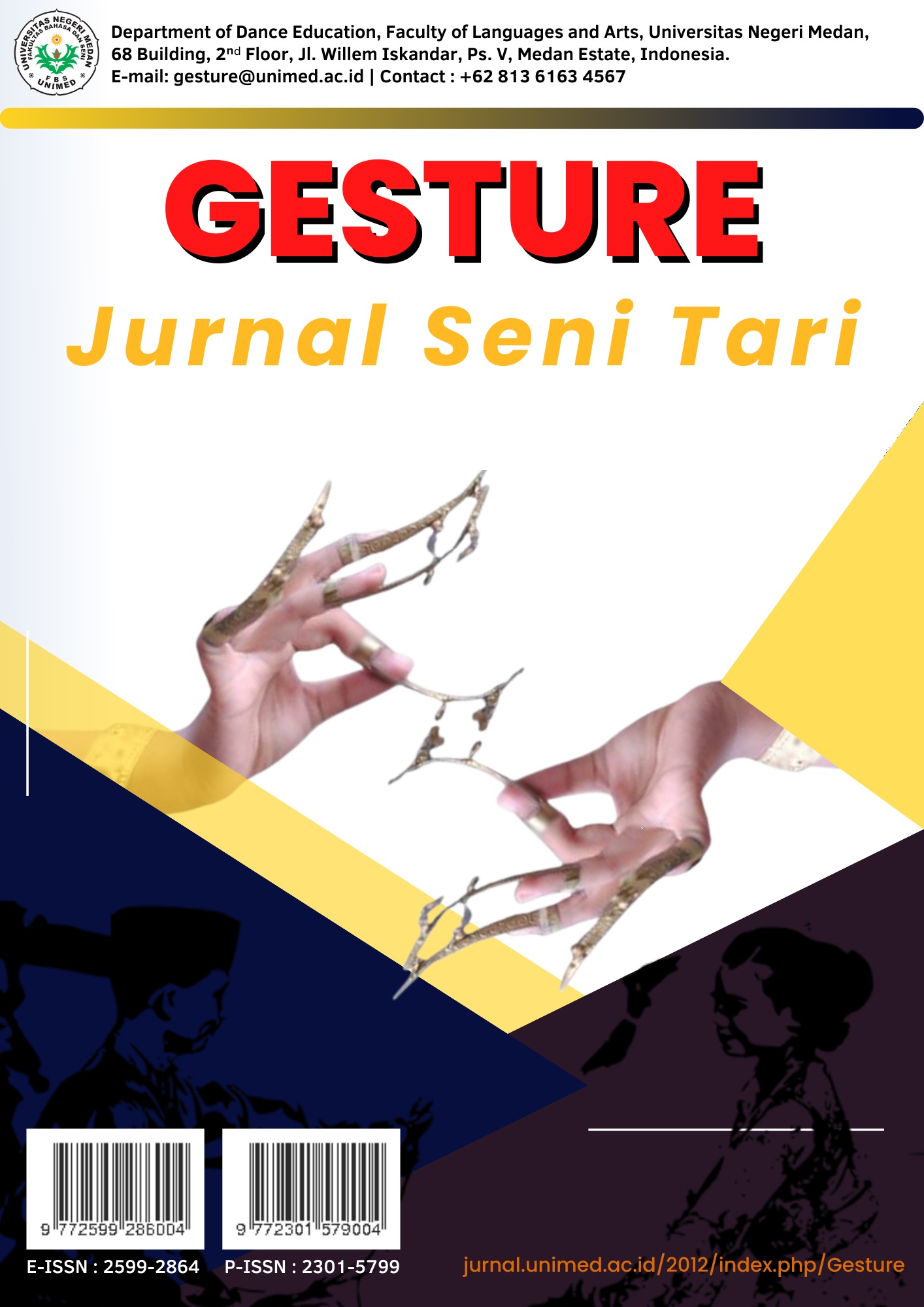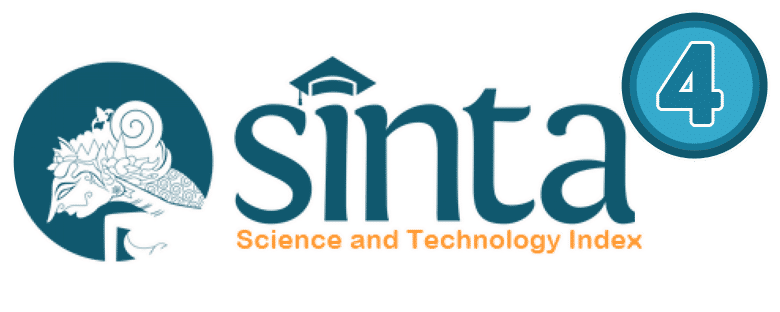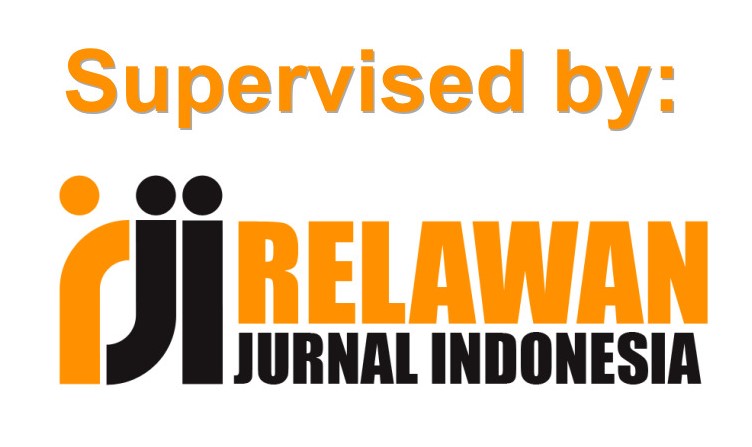Nilai Etika dalam Tortor Hata Sopisik pada Masyarakat Batak Toba di Kabupaten Samosir
DOI:
https://doi.org/10.24114/gjst.v14i2.69686Abstract
This research aims to describe the ethical values in Tortor Hata Sopisik among the Batak Toba community in Samosir Regency, using the ethical value theory according to K. Bertens who defines ethics as norms that regulate human behavior. This qualitative research was conducted at Sanggar Seni Sukacita, Ronggurnihuta, Samosir Regency, with a sample consisting of 6 Tortor Hata Sopisik dancers and 2 artists as informants. Data were collected through observation, interviews, and documentation, then analyzed descriptively qualitatively. The research results show that each type of movement in Tortor Hata Sopisik reflects ethical values based on religious norms, morality, politeness, and law. Religious norms are evident in the somba movement, which teaches prioritizing God and adhering to religious rules from an early age. The norms of decency are evident in the hushed movements that convey the heart's content subtly. The norm of politeness is reflected in the prohibition of excessive touching of the opposite sex, respecting women, and maintaining dignity. Legal norms are manifested through rules prohibiting dance partners from having the same clan or being in the dalihan na tolu kinship, in accordance with Batak customs that forbid marriage within the same clan.References
Azhari, P. I., & Sinaga, R. (2022). Tuan MH Manullang Pahlawan Indonesia Dari tanah Batak (1887-1979) (No. 1). Literasi Nusantara Abadi. https://digilib.unimed.ac.id/id/eprint/51861/1/Book.pdf
Dwiyanti, D., Ompusunggu, J. V., Silvia, M., Malau, P. S., & Dalimunthe, S. F. (2024). Penggunaan Kosakata Batak Toba Dalam Ragam Gerak Tortor Hatasopisik Untuk Memperkuat Identitas Lokal. Jurnal Intelek Insan Cendikia, 1(4), 474-482. https://jicnusantara.com/index.php/jiic/article/view/458
Harahap, H. S. M., Siregar, H. F. A., & Darwis Harahap, S. (2022). Nilai-Nilai dan Praktik Moderasi Beragama Berbasis Kearifan Lokal di Sumatera Utara. Medan: Merdeka Kreasi Group.
Kurniawan, I., Humam, Q. A., Chairunisa, A. F., Zharfani, G. N., Salsabila, A., Putri, A., ... & Fauziah, J. N. (2023). Hakikat, etika, dan filsafat komunikasi dalam dinamika sosial. Jakarta: Mahakarya Citra Utama Group.
Nainggolan, F., Prasetyo, T., & Tanjaya, W. (2023, December). Protection of Batak’s Tortor in The Perspective of Intellectual Property Rights. In 3rd International Conference on Law, Governance, and Social Justice (ICoLGaS 2023) (pp. 504-516). Atlantis Press. https://doi.org/10.2991/978-2-38476-164-7_46
Pastika, I Gede Tilem, and Ida Bagus Komang Sindu Putra. (2024). Mengenal Tari Widya Dewi, Dewi Saraswati. Bali: Nilacakra.
Salsabila, R., Octaviani, L., Adilla, F., Sazali, H., & Dalimunthe, M. A. (2022). Development of Tor Tor Dance in Batak Wedding Ceremony in Medan City. Jurnal ISO: Jurnal Ilmu Sosial, Politik dan Humaniora, 2(2), 171-174. https://doi.org/10.53697/iso.v2i2.824
Situmorang, Jonar. (2023). Asal-Usul, Silsilah Dan Tradisi Budaya Batak. Medan: Penerbit Andi.
Tinambunan, E. R. (2022). Gondang Batak Toba: Makna religi dan implikasinya pada keagamaan dan adat. Jurnal SMART (Studi Masyarakat, Religi, dan Tradisi), 8(2), 261-273. https://doi.org/10.18784/smart.v8i2.1775
Downloads
Published
Issue
Section
License
Copyright (c) 2025 Sufrianty Simbolon, Ruth Hertami Dyah Nugrahaningsih

This work is licensed under a Creative Commons Attribution-ShareAlike 4.0 International License.
Authors published with the Gesture: Jurnal Seni Tari agree to the following terms:
- Authors retain copyright and grant the journal the right of first publication with the work simultaneously licensed under a Creative Commons Attribution License (CC BY-SA 4.0) that allows others to share the work with an acknowledgment of the work's authorship and initial publication in this journal.
- Authors are able to enter into separate, additional contractual arrangements for the non-exclusive distribution of the journal's published version of the work (e.g., post it to an institutional repository or publish it in a book), with an acknowledgment of its initial publication in this journal.
- Authors are permitted and encouraged to post their work online (e.g., in institutional repositories or on their website) prior to and during the submission process, as it can lead to productive exchanges, as well as earlier and greater citation of published work. (See The Effect of Open Access)








